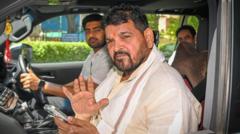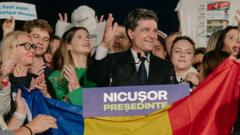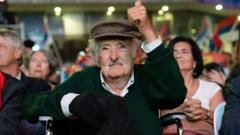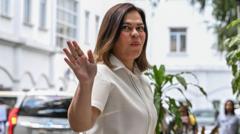In a recent electoral event marred by a boycott from the majority of opposition parties, Venezuela’s ruling PSUV party proclaimed significant victories, winning 23 out of 24 governorships and securing a strong majority in the National Assembly. Despite claims by the electoral council of a 42.6% turnout, opposition leaders contend that participation was below 15%, denouncing the election as a farce amidst ongoing governmental repression.
Venezuela’s Ruling Party Celebrates Election Victory Amid Opposition Boycott
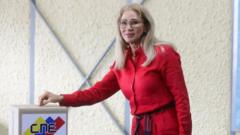
Venezuela’s Ruling Party Celebrates Election Victory Amid Opposition Boycott
The United Socialist Party of Venezuela (PSUV) claims a decisive win in regional and parliamentary elections, disregarded by most opposition parties who denounce the legitimacy of the vote.
Venezuela's ruling United Socialist Party of Venezuela (PSUV) has declared a sweeping victory in the latest regional and parliamentary elections, amidst an opposition boycott. The electoral council, perceived to be aligned with the Maduro administration, reported that the PSUV secured the governorship in 23 of the country’s 24 states and obtained 82.68% of the votes in the legislative elections for the National Assembly.
Opposition figures, however, vehemently criticized the elections as a "farce," with María Corina Machado stating that voter turnout was less than 15%. Independent observers noted sparse attendance at polling stations, contrasting with previous elections, yet the electoral council claimed a turnout of 42.6%. This discrepancy has fueled further skepticism regarding the council’s impartiality, particularly given its history of favoritism towards the ruling party.
Following the contentious presidential elections last July, where the PSUV's Nicolás Maduro was declared victor without transparent voting results, many opposition leaders, including Machado, have faced intimidation and repression. Edmundo González, an opposition candidate who had initially led the electoral challenge, was forced into exile after a crackdown on dissent. Machado, actively opposing the legitimacy of the recent vote, called for a boycott, insisting past results must be honored before new elections could take place.
Though the boycott was largely upheld, a few opposition candidates, such as Henrique Capriles and others, decided to participate, arguing that engaging in elections was crucial for their survival and resistance against the regime. This choice to defy boycott calls faced backlash from Machado, who accused them of betraying the broader opposition movement.
The ruling party has since celebrated its electoral dominance, reclaiming areas such as Zulia and Barinas, cities closely linked to the legacy of former president Hugo Chávez. Only Cojedes remains under opposition control.
Additionally, many opposition members faced pre-election arrests, with accusations of plotting to undermine the voting process, described by Machado as state-sponsored terror. The aftermath of the elections also included controversies over representing the disputed Essequibo region in Guyana, where Venezuela went against international court orders by conducting an election in a territory outside its control. This further escalated tensions between Caracas and Georgetown, with the Guyanese government condemning the act as an infringement on their sovereignty.


